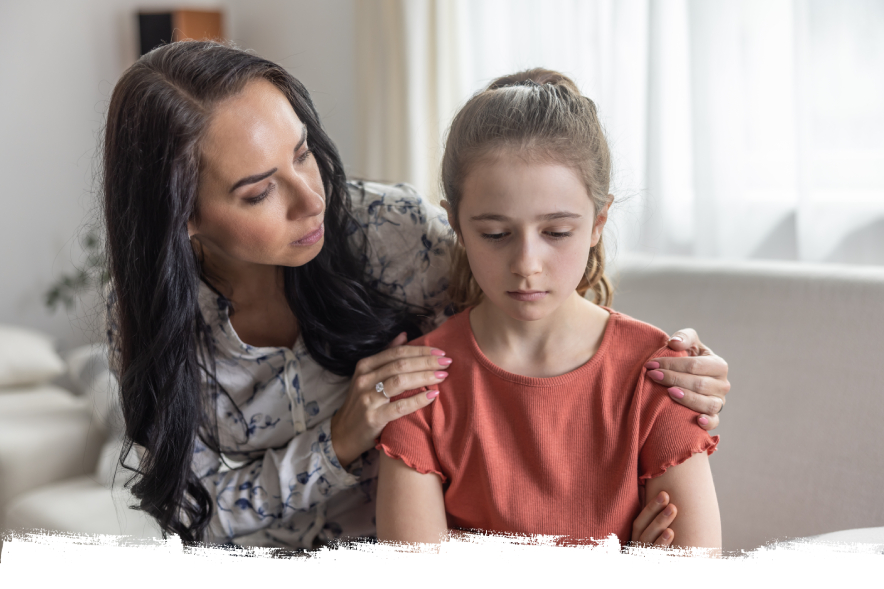Developmental Milestones and Divorce
Each age has its sensitivities. As children grow, their cognitive abilities expand, their social circles widen, and their emotional complexities deepen. Here's how they might perceive and react to divorce based on these developmental milestones:
- Toddlers (1-3 years old): These little ones are setting the foundation of their emotional world. Routine is their anchor. Divorce disrupts this, resulting in anxiety. While they might not grasp the reasons, the absence of a parent can be distressing. Symptoms can include mood swings, a return to thumb-sucking, or increased tantrums.
- Preschoolers (3-5 years old): Imagination reigns supreme in this age group. Unfortunately, this means they might weave stories where they're the cause of the divorce. Fear of abandonment or thoughts like "Did I do something wrong?" can be prevalent. Physically, they might exhibit sleep disturbances or become excessively clingy.
- School-age (6-12 years old): A more concrete understanding of relationships emerges now. While they grasp the concept of divorce, it's accompanied by feelings of torn loyalty between both parents. They might experience guilt, thinking they could've prevented it. There's also a significant fear of the unknown: "Where will I live? Will I change schools?"
- Teenagers (13-18 years old): The teenage years are tumultuous as is. Add divorce to the mix, and it's a recipe for heightened emotional distress. They might feel anger, embarrassment, or profound sadness. Some might act out in rebellion, while others could retreat into a shell.
The Crux Age
While every age has its set of challenges, children aged 6-10 often bear the brunt of the emotional upheaval of divorce. Here's why:
- Their developing brains are caught between understanding complex emotions and not being mature enough to cope.
- Social acceptance becomes pivotal at this age. Feeling different because their family doesn't resemble their peers' can be deeply isolating.
- They may harbor fantasies of their parents reuniting, leading to prolonged emotional turmoil each time this doesn't materialize.
Support is the Key

Amidst the chaos and confusion of divorce, providing unwavering support for children is paramount. It's not just about ensuring they're physically cared for, but it’s about ensuring their emotional and psychological well-being remains intact. As they grapple with changes, the stability we provide can significantly mitigate the adverse effects. Here are comprehensive strategies to ensure that children emerge from the experience feeling secure, loved, and understood:
Open Communication
Active Listening: It's one thing to hear, and another to truly listen. When your child talks, listen intently, absorbing not just words but feelings and concerns.
Encourage Expression: Children might not always volunteer their feelings. Regularly initiate conversations, asking them how they feel, and assuring them it's okay to have mixed emotions.
Honesty: While age-appropriate, be honest about the situation. This builds trust.
Consistent Routine
Maintain Daily Rituals: Whether it's bedtime stories, weekend outings, or Friday movie nights, try to keep disruptions minimal. This provides a sense of normalcy.
Establish Rules Across Households: If possible, ensure rules are consistent in both parents' homes. This reduces confusion and creates stability.
Counseling and External Support
Therapy: Consider therapy not as a last resort but as a preventive measure. A professional can equip your child with tools to process emotions healthily.
Support Groups: Groups, often organized by schools or communities, can help children see they're not alone in this experience.
Reinforce Your Love
Physical Affection: Hugs, cuddles, or a reassuring pat on the back can make a world of difference.
Affirmations: Regularly tell your children you love them, and the divorce isn’t their fault. This alleviates any guilt or insecurities they might be harboring.
Quality Time: Spend time with your child, engaging in activities they love. This reinforces your bond and provides them with a distraction from the changes.
Educate Yourself
Books and Resources: Numerous books delve into children's psychology during divorce. Understand what they're experiencing to better cater to their needs.
Parenting Classes: These equip you with strategies tailored for divorcing parents.
Engage Their School
Teacher Communication: Inform teachers about the situation. They can be more understanding and keep an eye out for behavioral changes.
Utilize School Resources: Many schools offer counseling services or have psychologists who can assist.
Stay Neutral
Avoid Badmouthing: Never speak ill of the other parent in front of the child. It places them in an uncomfortable position, often making them feel they need to choose sides.
Unified Front: On matters concerning the child, present a united front. This stability prevents further confusion or feelings of torn loyalty.
Final Thoughts
Understanding the intricacies of how children navigate the heartbreak of divorce helps in extending the right support. By tuning into their emotional frequencies and offering steadying guidance, we can lessen the trauma and help them emerge resilient.
